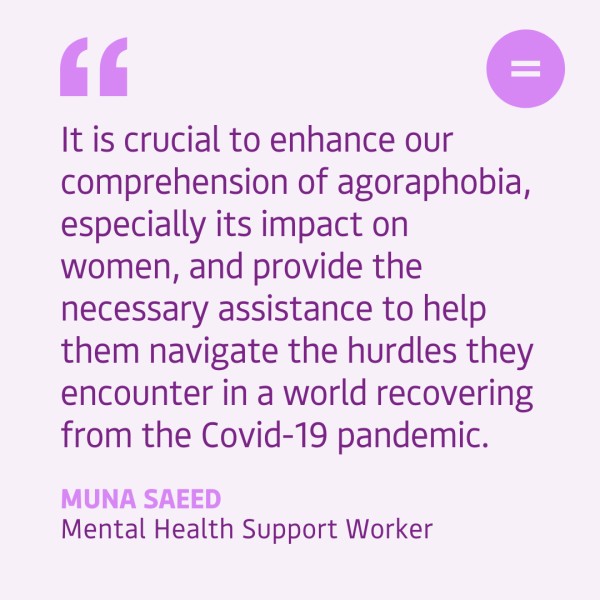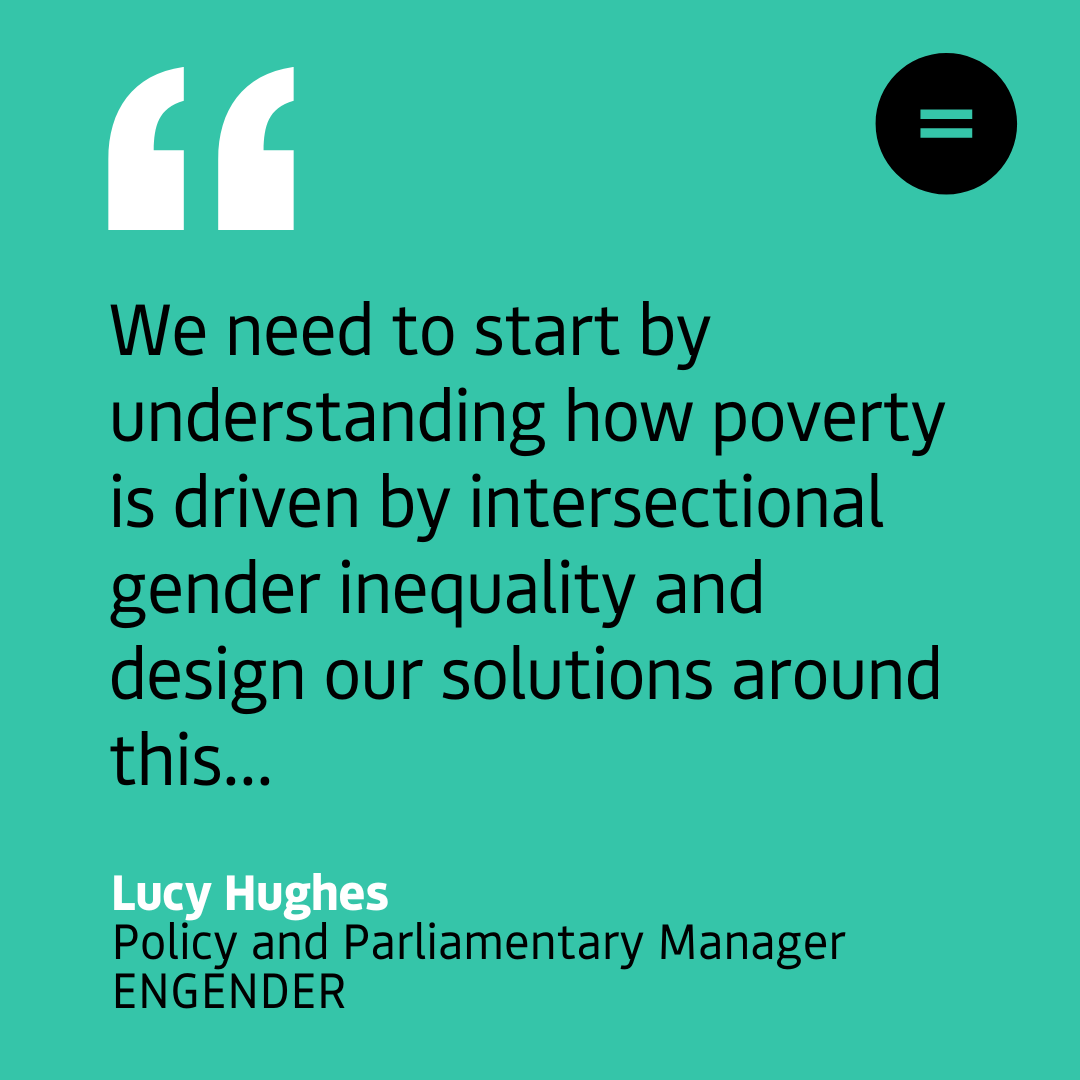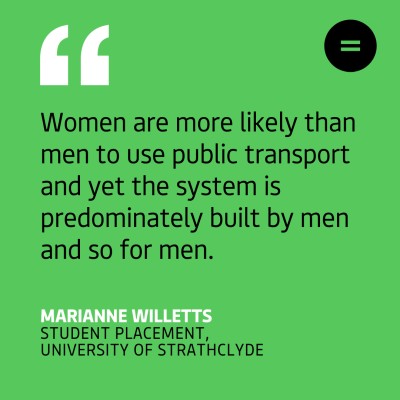Engender blog
All of Engender’s latest news. Reports, reviews, books, articles, and information from across Scotland’s women’s sector.
We would love to hear from other feminists around Scotland. Check out our guidelines for more information on how you can blog for us.
GUEST BLOG: Agoraphobia and Gender Post Covid-19
Women’s social, economic, cultural and political inequality with men undermines good mental health and wellbeing in a wide range of ways, including the impacts of gender stereotyping, medical misogyny and racism, and of course the disproportionate impact that austerity, Covid-19 and the cost of living crises have on women's mental health.
In this long read, guest author Muna Saeed explores the impact of gender on agoraphobia, and how this affects women in the aftermath of the Covid-19 pandemic.

Imagine a world where the thought of leaving your home fills you with dread and anxiety.
As the world outside continues to spin, you're trapped inside, desperately seeking comfort from the chaos that lies beyond your front door. This is the reality for those diagnosed with agoraphobia, a condition that goes beyond a simple fear of public spaces. It's a suffocating fear of being in situations where escape is difficult, and the fear of panic attacks threatens to consume your every waking moment. But what happens when we introduce gender into this equation? As a mental health worker who works closely with individuals grappling with mental health challenges, including agoraphobia, my aim is to shed light on the intricate and gendered complexities of this condition in a post-Covid-19 world.
Cost of Living: Fight Against Poverty is a Fight for Gender Equality
Lucy Hughes, Engender's Policy and Parliamentary Manager, recently published an article about the ongoing crisis of women’s poverty, as part of the Poverty Alliance’s Scottish Anti-Poverty Review. The article argues that intersectional gender analysis is essential when developing policy that tackles poverty in Scotland. In this blog Lucy has pulled out some of the key headlines from the article, which is available to read in full here.

The first half of 2023 has seen changes in political leadership for Scotland, with Humza Yousaf taking over as First Minister. This has led to the Scottish Government creating three new ‘critical missions', including: ‘Equality - tackling poverty and protecting people from harm.’ As a result, anti-poverty work is high on the political agenda, which presents a vital opportunity to share work that has been done to show the gendered nature of poverty in Scotland.
Engender has already been working alongside many others in the women’s sector and beyond, to show how the Cost of Living crisis is a crisis for women’s equality because our economy is structured in a way which systemically financially disadvantages women. We have advocated at an international level to highlight how women’s human rights under ICESCR are being failed in Scotland. Ultimately, we know that women’s poverty is a result of long-standing, deep-rooted, and systemic fault lines in our society.
As anti-poverty campaigners, if we are to build solutions that will eradicate poverty in Scotland, we need to start by understanding how poverty is driven by intersectional gender inequality and design our solutions around this. The lives of women, especially if faced with intersecting marginalisation, are continually shaped by having less access to well-paid secure work, a vastly higher likelihood of reliance on shrinking social security, and lesser access to resources within the household.
Women’s incomes are lower than men’s, which means women are more likely to experience financial precarity, high levels of debt and arrears, a lack of long-term savings and access to adequate pensions. Black and minority ethnic women and disabled women are more likely to be in in-work poverty than white women and non-disabled women. Women are the majority of primary caregivers for children and are more likely to be unpaid carers for disabled and older people. The widespread nature of men’s violence against women has a significant impact on access to resources, incomes, and financial security – and often includes financial abuse. These factors see women, particularly minoritised women, as the household managers and shock absorbers of poverty, fully exposed to the sharp end of economic or other crises.
To tackle the gendered nature of poverty, we must first recognise these gendered issues around care, gender-based violence, and the linked existing structural inequality that exists across the labour market.
Deep-rooted occupational segregation, alongside systemic issues with returning to work after providing unpaid care for children, substantially diminishes women’s lifetime earnings and results in women being clustered into undervalued roles. This is largely due to harmful assumptions and stereotypes about women’s and men’s capabilities, gender roles and what constitutes ‘work.’
Women are also twice as likely as men to rely on social security, and therefore on a system that fuels poverty. Analysis from the House of Commons Library in 2016 found that up to 86% of net ‘savings’ carved from social security payments and public services between 2010 and 2020 will have come from women’s incomes. This leaves disabled, Black and minority ethnic women, refugee and migrant women, lone parents, care experienced women, unpaid carers and women experiencing domestic abuse at even greater risk of poverty and destitution.
Despite the wealth of qualitative research on women’s experiences, this is rarely reflected in official data that is used to shape and determine policy decisions. Scotland is still not capturing enough high quality, intersectional data about women’s experiences of poverty.
.png)
For example, the use of household measures of poverty in Scotland assumes that household income is equally distributed and accessible to women and men. There are significant evidence gaps about the experiences of women from different marginalised communities, which actively obscures the specific discrimination and pressures many women are subject to, and as such, the true extent of women’s poverty and, therefore, child poverty.
Anti-poverty work which looks at reforming social security at devolved and UK levels must understand the gendered nature of the reliance of women on the welfare safety net and the discrimination that is built into its delivery. As we see innovation in Scotland of new economic solutions to tackle poverty, such as the development of the Minimum Income Guarantee, we must work together to ensure such anti-poverty policies do not further entrench women’s inequality but actively seek to address it as a core goal.
In practice, this means lobbying for intersectional gender analysis to shape policies that explicitly address the inequality baked into the fabric of our social security systems and the structure of our economy. It starts by making visible how poverty and economic inequality are experienced at higher rates by women and marginalised groups across our society, in large part due to the way our economy and welfare systems are designed and shaped by decision-makers.
Apply now for our Board Pioneer Programme

Want to get involved in feminist governance and see how a board works? Find out more about our pilot Board Pioneer Programme in this blog.
Today we’re opening applications for Engender’s Board Pioneer Programme, a one-year opportunity to develop the skills and experience of someone who is interested in getting involved in feminist governance and finding out how a board works.
Our Board Pioneer will attend Engender’s board meetings over the course of a year, including our AGM, and get the chance to share their knowledge and expertise with our board, as well as building their networks within the women’s movement and contributing to Engender’s work for women’s equality in Scotland.
See the full advert and apply online here
GUEST POST: Digital safety and women in politics

Engender and the Equal Media and Culture Centre for Scotland have hosted student placements from the MSc in Social Research at the University of Edinburgh and the University of Strathclyde Applied Gender Studies and Research Methods course. As part of their research outputs, the students have produced a series of blogs.
In this post, Yoke explores abuse online in the UK and beyond – with a focus on the experiences of women politicians.
In January 2023, the First Minister of the Scottish National Party, Nicola Sturgeon, resigned from her role. In her speech announcing her resignation, she described the “brutality” of public life as a politician, specifically referring to it as “hostile” for female politicians, highlighting the role that social media plays in the abuse that women politicians receive.
GUEST POST: 'Text me when you're home!'

Today we're publishing the first in a series of blogs from the Spring student placements Engender hosted from the University of Strathclyde Applied Gender Studies and Research Methods course.
In this post, Marianne looks at how gender inequality and violence against women affect how women experience public spaces and public transport, and how and when these issues are recognised in the Scottish Parliament.
Keys between knuckles, hair down, earphones out. A routine all too familiar to a woman travelling home after sunset alone.
A male friend once told me that him and his flatmates had a ‘72-hour rule’; if one of them didn’t come home without telling the others where they were, they would wait 72 hours before ‘overthinking’ it and calling the police. I can’t speak for all women, but personally, if it was my female flatmate or friend, it would be at most 12 hours before the panic would set in and a further 12 before I would call the police. Women do not have the luxury of not taking precautions when commuting late at night. Travelling from A to B is necessary in many circumstances, and safety when doing so should be a given, but it is not.
Downloads
 Engender Briefing: Pension Credit Entitlement Changes
From 15 May 2019, new changes will be introduced which will require couples where one partner has reached state pension age and one has not (‘mixed age couples’) to claim universal credit (UC) instead of Pension Credit.
Engender Briefing: Pension Credit Entitlement Changes
From 15 May 2019, new changes will be introduced which will require couples where one partner has reached state pension age and one has not (‘mixed age couples’) to claim universal credit (UC) instead of Pension Credit.
 Engender Parliamentary Briefing: Condemnation of Misogyny, Racism, Harassment and Sexism
Engender welcomes this Scottish Parliament Debate on Condemnation of Misogyny, Racism, Harassment and Sexism and the opportunity to raise awareness of the ways in which women in Scotland’s inequality contributes to gender-based violence.
Engender Parliamentary Briefing: Condemnation of Misogyny, Racism, Harassment and Sexism
Engender welcomes this Scottish Parliament Debate on Condemnation of Misogyny, Racism, Harassment and Sexism and the opportunity to raise awareness of the ways in which women in Scotland’s inequality contributes to gender-based violence.
 Gender Matters in Social Security: Individual Payments of Universal Credit
A paper calling on the Scottish Government to automatically split payments of Universal Credit between couples, once this power is devolved to the Scottish Parliament.
Gender Matters in Social Security: Individual Payments of Universal Credit
A paper calling on the Scottish Government to automatically split payments of Universal Credit between couples, once this power is devolved to the Scottish Parliament.
 Gender Matters Manifesto: Twenty for 2016
This manifesto sets out measures that, with political will, can be taken over the next parliamentary term in pursuit of these goals.
Gender Matters Manifesto: Twenty for 2016
This manifesto sets out measures that, with political will, can be taken over the next parliamentary term in pursuit of these goals.
 Scottish NGO Briefing for UN Special Rapporteur on Violence Against Women
Joint briefing paper for the UN Rapporteur on Violence Against Women.
Scottish NGO Briefing for UN Special Rapporteur on Violence Against Women
Joint briefing paper for the UN Rapporteur on Violence Against Women.

Newsletter
Sign up to receive our newsletter here:
Sign up to our mailing list
Receive key feminist updates direct to your inbox: